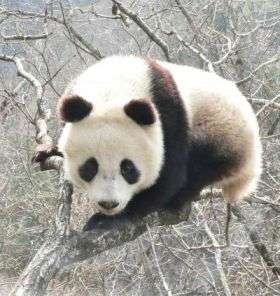Panda personality traits may play a significant part in breeding success

It's an established fact that compatibility is important to humans when picking a mate—but conservationists have discovered that Homo sapiens aren't the only species where well-matched personalities may make or break a relationship. According to a study published in Biological Conservation, an international peer-reviewed journal in the discipline of conservation biology, personality traits may play a large part in the mating behaviors of the giant panda—and breeding successes or failures may depend on whether a bear's disposition is complementary to that of its prospective mate. As part of the study, San Diego Zoo Global biologists used various assessments to test their theory, dividing the pandas into several personality categories based on their exploratory ability, aggressiveness, excitability, fearfulness and general activity. Then they tested how the differences in each of these traits influenced the willingness of the bears to mate with one another, and whether such parings produced offspring.
So far, their findings have indicated some personality traits are more effective together than others—either enhancing chances for reproduction or diminishing them. For example, the data shows that excitable males that paired with less-excitable females fared better reproductively. Also, males that were more aggressive than their female partners, when paired, were more likely to mate and produce cubs than more-aggressive females paired with less-aggressive males.The International Union for Conservation of Nature (IUCN) last year reclassified the giant panda as
Vulnerable—indicating in their report that current conservation efforts are working; however, they acknowledged that panda breeding still remains a problem. Currently, scientists count nearly 2,000 giant pandas living in their native habitats—and the majority of them are adults. While breeding and reintroduction programs are becoming more effective by providing more pandas to bolster the wild populations, conservationists believe that learning more about the importance of personality combinations in breeding success could ultimately help boost the number of pandas even further—not only in accredited zoos, but also in their habitats in China.
San Diego Zoo Global's role in panda conservation began decades ago, when the San Diego Zoo first introduced two giant pandas—on loan from China—to the American public. The Zoo's historic giant panda breeding program began after female panda Bai Yun (pronounced By Yoon) arrived in 1996. She was the first panda to successfully give birth to surviving cubs in the United States—and since then, she has helped researchers and keepers learn more about panda behavior, pregnancy, birth and maternal care.
Journal information: Biological Conservation
Provided by Zoological Society of San Diego




















